Menopause is a natural milestone in a woman’s life, marking the end of her reproductive years. While it is a normal part of aging, the physical, chemical, mental, and emotional changes that accompany menopause can be challenging. As a kinesiologist, I have seen how holistic approaches, including Kinesiology, can significantly support women during this transition. In this blog, I’ll explore how kinesiology can help maintain balance during menopause and how it can assist women in navigating this life stage with confidence and vitality.

Understanding Menopause: What to Expect
The Onset of Menopause: Signs and Symptoms
It is preceded by a transitional phase called perimenopause, which can begin in a woman’s late 30s or early 40s and lasts until menopause. During this time, the ovaries undergo several changes:
- Fluctuating Hormone Levels: Estrogen and progesterone levels fluctuate, leading to irregular menstrual cycles.
- Decreased Ovulation: Ovulation becomes less predictable, contributing to irregular periods.
- Decline in Egg Quantity and Quality: The number and quality of eggs decrease, reducing fertility.
- Symptoms of Hormonal Changes: Hot flashes, night sweats, mood swings, and changes in libido are common due to hormonal fluctuations.
- Follicle-Stimulating Hormone (FSH) Levels: FSH levels rise, indicating decreased ovarian responsiveness.
- Ovarian Atrophy: Ovaries shrink in size due to decreased activity and hormonal changes.
- Menstrual Irregularities: Menstrual cycles become unpredictable, eventually ceasing altogether at menopause.
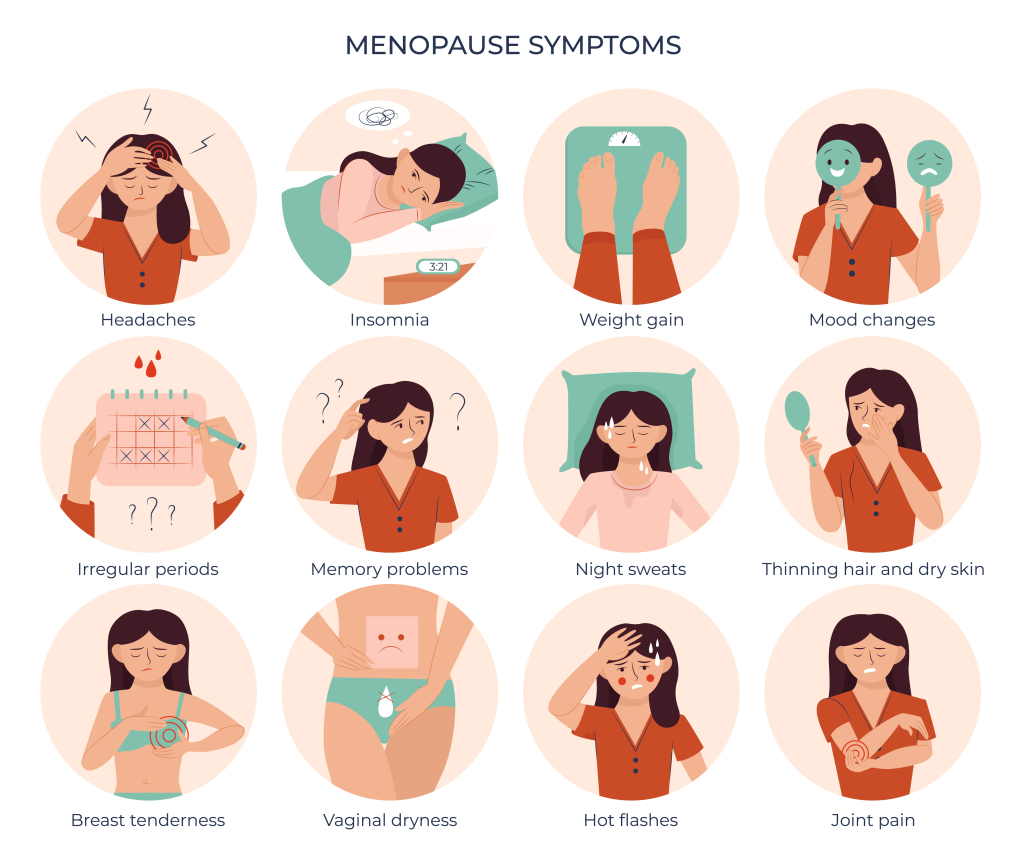
Top Ten FAQs About Menopause
1. How long does it last?
Menopause itself is a point in time, but the transition, known as perimenopause, can last from a few months to several years. Postmenopause lasts for the rest of a woman’s life.
2. What are the first signs?
The first signs often include irregular periods, hot flashes, and night sweats.
3. Can menopause cause weight gain?
Yes, hormonal changes can lead to weight gain, particularly around the abdomen.
4. How can I manage hot flashes?
Dress in layers, keep cool, avoid triggers like spicy foods, and consider stress-reduction techniques.
5. Does it affect mental health?
Yes, it can cause mood swings, anxiety, and depression due to hormonal fluctuations.
6. How does menopause impact bone health?
The decline in estrogen increases the risk of osteoporosis. Weight-bearing exercises and supplements can help maintain bone density.
7. What is hormone replacement therapy (HRT)?
HRT involves taking estrogen and sometimes progesterone to alleviate menopausal symptoms but has potential risks that need to be discussed with a healthcare provider.
8. Are there natural remedies for menopause symptoms?
Yes, vitamins, supplements, and herbal remedies like black cohosh and red clover can help manage symptoms.
9. When should I see a doctor?
Consult a healthcare professional if symptoms become unmanageable or if there are concerns about associated conditions like heart health or osteoporosis.
10. How can kinesiology help?
Kinesiology takes a holistic approach to health, addressing the mental, chemical, physical, and emotional realms (M.C.P.E.) to help women navigate menopause.
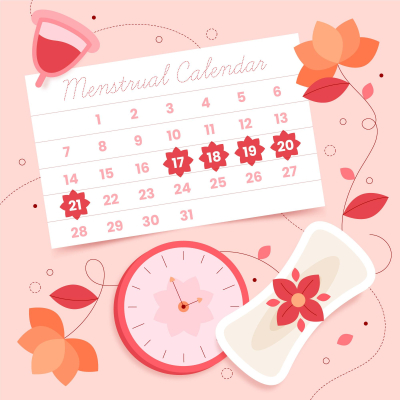
Personalized Support Through Kinesiology
In my practice, I have seen many women who knew little about menopause and how it affects their bodies. It’s encouraging to see menopause gaining attention in the media, but often the solutions offered are limited to hormone replacement therapy (HRT) or antidepressants. Kinesiology offers a natural, holistic approach to support women through this journey, helping them thrive and enjoy life.
Addressing Individual Needs
Every woman’s experience of menopause is unique. Kinesiologists tailor their approach to individual needs:
- Mental Health: Tools and techniques to navigate or release emotional stresses associated with menopause.
- Chemical Health: Muscle testing for food sensitivities and nutritional needs, including adaptogenic herbs and essential nutrients.
- Physical Health: Techniques to promote pelvic stability, reduce joint pain, alleviate vaginal atrophy, and improve bladder control.
- Electrical Health: Assessing and balancing energy levels through work on relevant chakras and meridians.

Embracing Change: The Emotional Journey of Menopause
Menopause is not just a physical transformation, but a deeply emotional journey that can redefine a woman’s sense of self. This life stage often brings a mix of emotions, from relief at the end of menstrual cycles to anxiety about aging and changes in body image. It is a time of introspection and re-evaluation of life priorities.
Recognizing and embracing these emotions is crucial. Support groups, counseling, and open conversations with loved ones can provide immense comfort. Emotional resilience can be bolstered through mindfulness practices and self-compassion. Understanding that menopause is a natural part of life, and a new beginning rather than an end, can help women approach this phase with positivity and strength.
Empowering oneself with knowledge and holistic support, like Kinesiology, can transform the menopause journey into a period of growth and self-discovery, fostering a renewed sense of purpose and well-being.
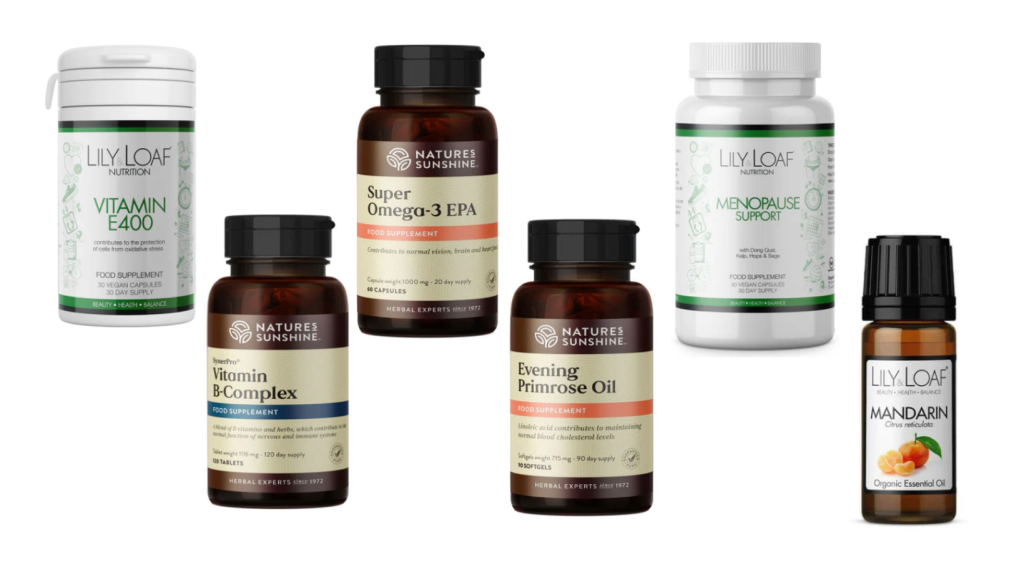
Natural Remedies: Vitamins and Supplements for Menopause Relief
For women looking for alternative or complementary ways to manage menopause symptoms, a range of natural remedies is available. Vitamins and supplements can be particularly effective. For example:
*Vitamin E is known for its ability to reduce hot flashes and vaginal dryness.
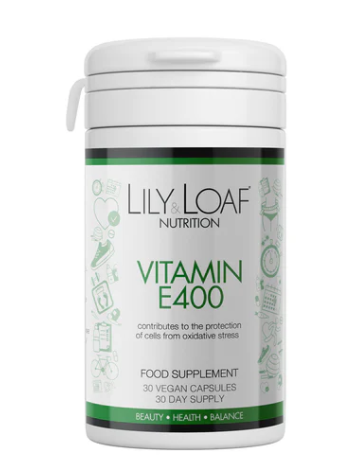
Buy here
- Contributes to the protection of cells from oxidative stress
- Supports the immune system
- Easy-to-Swallow Capsule
- Allergen Free Suitable for Vegans & Vegetarians
*B vitamins, especially B6, are recognized for their role in mood regulation and alleviating depression.
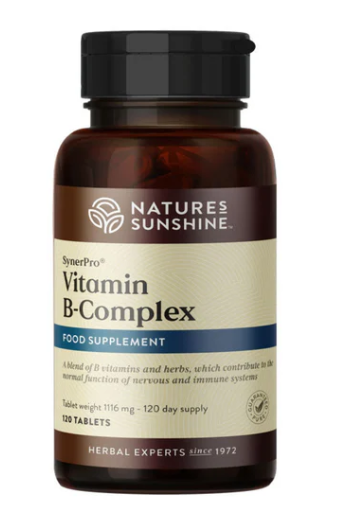
Buy here
- Contains an array of B vitamins with a SynerPro Concentrate
- Contributes to normal energy-yielding and to the reduction of tiredness and fatigue
- Contributes to the normal function of the nervous system
- Contributes to normal macronutrient metabolism
*Omega-3 fatty acids, often found in fish oil supplements, can help with mood swings and joint pain.
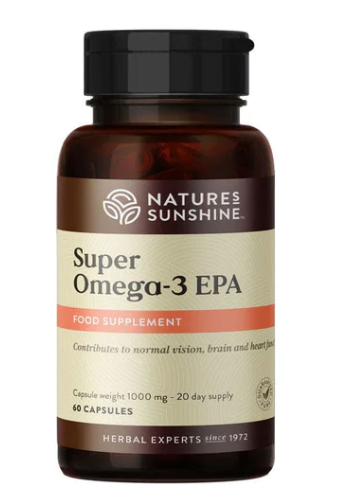
Buy here
- Provides 1140mg of EPA and 570mg DHA per daily dose
- EPA and DHA contribute to the normal function of the heart
- EPA contributes to the maintenance of normal brain function
- DHA contributes to the maintenance of normal vision
*Herbal remedies such as black cohosh, red clover, and evening primrose oil are widely used by women to relieve menopausal symptoms, though their effectiveness and safety are still being studied.
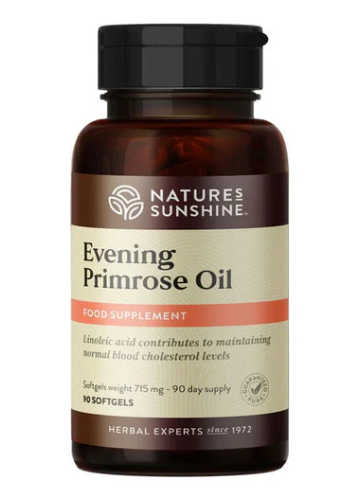
Buy here
- A source of Omega-6 Fatty Acids: GLA and linolic acid
- GLA assists with the production of chemical messengers including prostaglandins
- Includes Antioxidant Vitamin E
- Preservative-free, soft-gel, capsules
*Phytoestrogens, which are plant-based compounds that mimic estrogen in the body and are found in soy products, can provide a mild estrogenic effect that may be helpful for some menopausal symptoms.
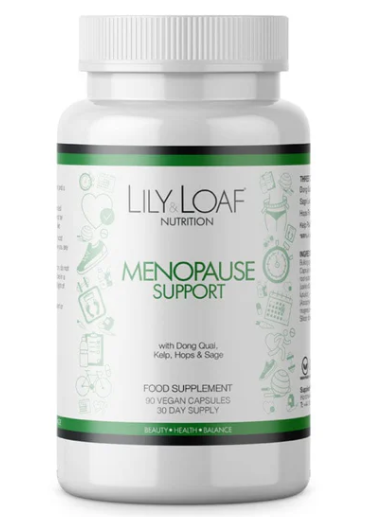
Buy here
- With Dong Quai, Kelp, Hops & Sage
- Suitable for vegetarians & vegans
- Dairy, gluten and GMO-free
- 30 Day Supply
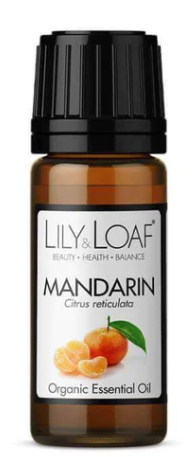
Buy here
- Diffuse to lift mood and spirit, reducing anxiety and tension, for relaxation and restful sleep
- Massage after blending to stimulate circulation, detoxify and rejuvenate skin
- Apply diluted to clarify oily skin, rejuvenate mature skin
- Blends well with Lemon, Clary Sage, Lavender & Frankincense
It’s important to note that the quality and potency of these supplements can vary, and they may not be suitable for everyone. Consulting a healthcare provider before starting any new supplement regimen is crucial to ensure they are safe and appropriate for your specific health needs.

How Can Exercise Help Menopause Symptoms?
Engaging in regular exercise offers a variety of scientifically supported benefits for managing menopause symptoms. Physical activity significantly improves both the physical and psychological aspects of menopause, helping to:
- Manage Weight and Maintain Muscle Mass: Exercise can help counter the metabolic changes often experienced during menopause by managing weight and preserving muscle mass.
- Promote Cardiovascular Health: Regular physical activity lowers the risk of heart disease and high blood pressure, which become more prevalent after menopause.
- Improve Bone Density and Strength: Weight-bearing exercises enhance bone density and strength, reducing the risk of osteoporosis that can intensify due to hormonal changes.
- Reduce Hot Flashes and Night Sweats: Exercise can decrease the frequency and severity of these common menopause symptoms.
- Enhance Flexibility and Balance: Incorporating flexibility and balance exercises into your routine can lower the chances of falls and fractures.
- Improve Sleep Quality: Regular exercise can help improve sleep, which is often disrupted during menopause.
- Boost Mood: Physical activity stimulates the release of endorphins, improving mood and reducing anxiety and depression, which can be exacerbated during menopause.
How Much Exercise to Do in Menopause?
Exercise is crucial whether you are approaching perimenopause or embracing life post-menopause due to its many benefits. NHS guidelines recommend at least 150 minutes of moderate-intensity exercise (which raises your heart rate and makes you breathe faster but still allows you to speak) or 75 minutes of vigorous-intensity exercise each week for those going through menopause.
Your exercise options are diverse, ranging from strength and resistance training to cycling, swimming, skipping, brisk walking, and even energetic gardening or housework. If you’re new to exercise and find the idea of 150 minutes daunting, start with 10-15 minutes of activity a day and gradually build up. Whatever form of exercise you choose, both your body and mind will reap the benefits.
Visit my Dietary Tips page to discover a curated collection of healthy recipes from amazing YouTube creators.
From nutritious breakfast ideas to satisfying dinner options, there’s something for every palate and dietary preference, including dairy-free, gluten-free, and sugar-free options.
Delight in flavorful meals while nourishing your body with wholesome goodness! Explore further and embark on a culinary journey towards vibrant health! 🍽️🌿
Holistic Care for a Natural Transition
It is important to remember that menopause is a normal and natural phase of a woman’s life, though experiences vary widely. While some women may transition with minimal symptoms, others may face more pronounced physical and emotional changes. Prioritizing overall health, including stress management, a balanced diet, regular exercise, and sufficient sleep, is essential.
Consulting with a Kinesiologist can provide personalized guidance and support tailored to individual needs and symptoms during this transitional phase. You don’t have to suffer through menopause. Effective, natural healthcare is available to help you maintain a healthy, active, and fulfilling life well into your postmenopausal years.
Living Well Beyond Menopause
Though menopause can be a complex transition, it also marks the beginning of a new chapter in life. By staying informed, prioritizing self-care, and maintaining open communication with healthcare providers, women can navigate menopause with confidence and vitality. Embracing the holistic support offered by Kinesiology can help you maintain balance and thrive during this significant life stage.

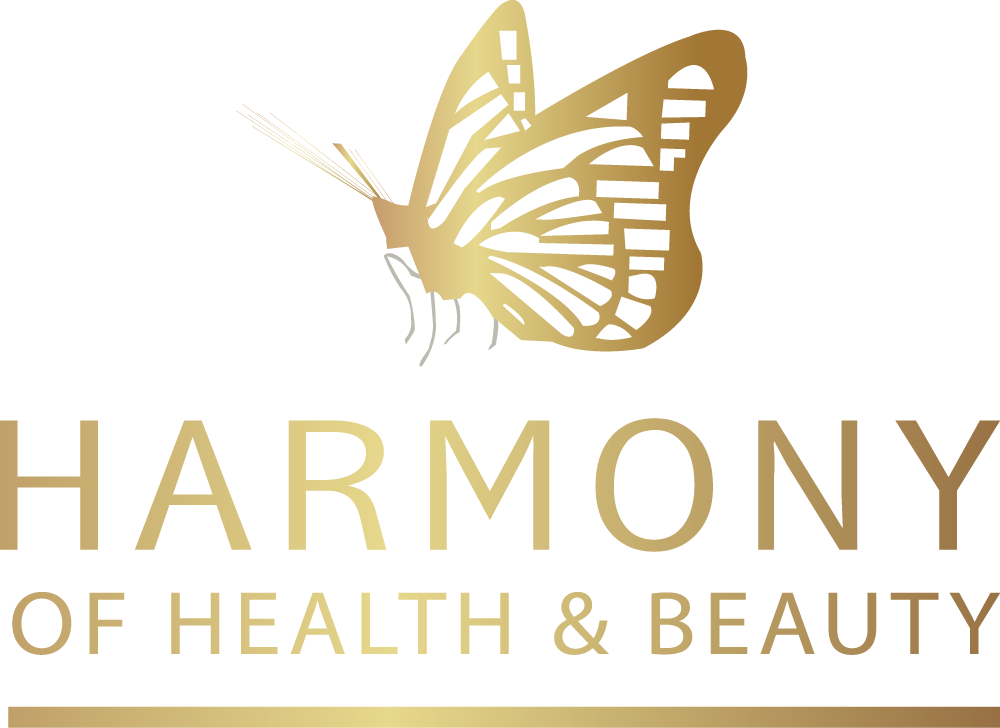

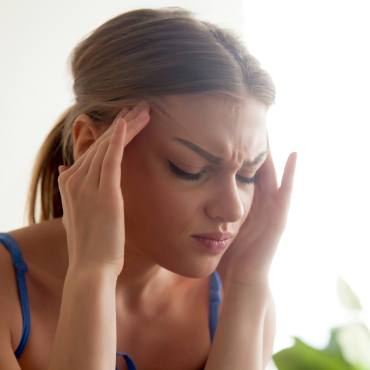
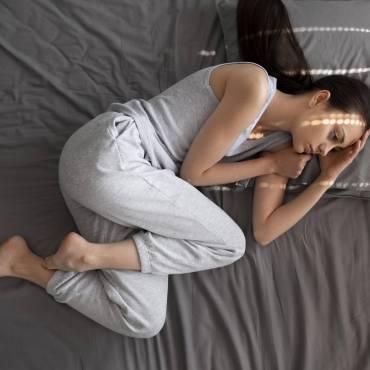
Add Comment